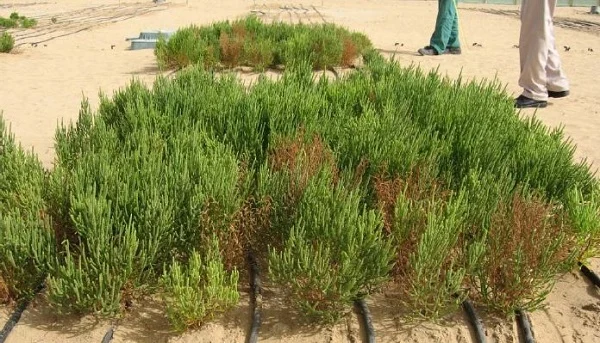There’s no technological challenge to flying commercial airliners on fuels with a substantial renewable component. It’s been done, done and done again.
The trick is in feeding a steady stream of aviation biofuels to the airlines at feasible prices – and it’s on that challenge that Boeing and several United Arab Emirates partners have announced they will collaborate. That they’re giving it a go in a place where agriculture is, to say the least, daunting, is pretty ambitious.
Joining Boeing in this effort to develop a sustainable aviation biofuel supply chain in the United Arab Emirates: Etihad Airways, Takreer, Total and the Masdar Institute of Science and Technology. In a preface to the announcement, Etihad did a 45-minute demo flight of a Boeing 777 burning biofuel, hoping to emphasize that homegrown-powered flight is possible right now, and suggesting how a supply process might work.

image via Boeing
“The biofuel was partially converted from plants by Total and refined into jet fuel by Takreer, a wholly-owned subsidiary of Abu Dhabi National Oil,” Boing said. “U.A.E. is now among a handful of countries that have produced and flown on their own aviation biofuel, which emits at least 50 percent less carbon dioxide than fossil fuel over its lifecycle.”

Halophyte test plot in the UAE (image via Sustainable Biofuels Research Consortium)
The consortium didn’t say what feedstock was used for these biofuels – an important consideration impacting their ultimate sustainability. Algae, jatropha and camelina have all gotten major play as feedstocks in aviation biofuels, but in the U.A.E. the best bet might be halophytes. These are plants that can be grown in the the harsh, salty desert. Masdar has done studies [PDF] on these plants as a potential feedstock.
An interesting twist to this story is that less than a week earlier, Boeing had come out with new company research promoting the use of “green diesel,” which differs from aviation biofuels in the process used to produced it (hydroprocessing for green diesel, whereas biodiesel is produced by the contact of non-petroleum oils with an alcohol).
Made from oils and fats, Boeing said green diesel is chemically similar to aviation biofuel and emits 50 percent less carbon dioxide than fossil fuels over a life cycle. Because it’s now produced for ground transportation uses, Boeing says “significant green diesel production capacity already exists in the U.S., Europe and Singapore that could supply as much as 1 percent – about 600 million gallons – of global commercial jet fuel demand.” The company said it was “working with the U.S. Federal Aviation Administration and other stakeholders to gain approval for aircraft to fly on green diesel, further reducing the aviation industry’s carbon emissions.”






